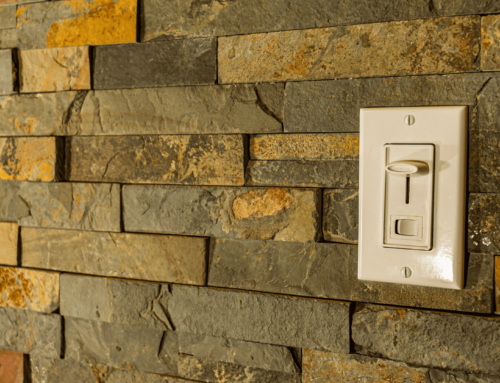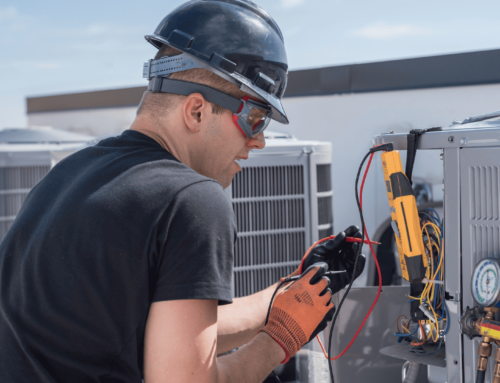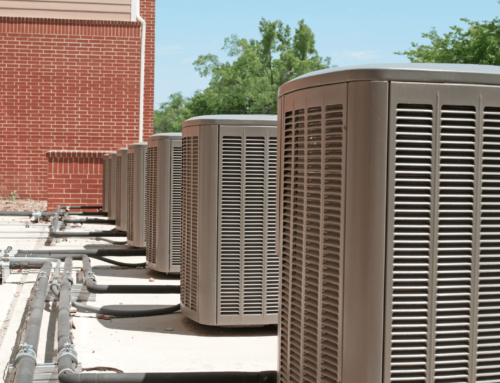
Dirty Coils and Filter
Winter storms often leave air conditioners clogged with dust and dirt. Debris can build up on the coils, as well as the filter, creating a perfect environment for mold and mildew. Cleaning the unit and replacing the filters typically solves the problem. While you don’t need an HVAC technician to replace your filters, coils are another matter. It’s possible to clean them with water and dish soap, but because they’re one of the most delicate parts of your AC system, it may be wiser to hire an HVAC technician instead.
Frozen Coils
Air conditioners rely on airflow to maintain a consistent and stable temperature. If airflow is blocked or restricted, temperatures inside the system can drop precipitously, low enough to freeze the excess moisture around the coils inside the unit. If this process goes on for too long, it can create a layer of dirty ice inside your air conditioner.
Stale ice can become a breeding ground for mold and bacteria. Most of the time, poor airflow is caused by clogged filters. Defrosting the unit and replacing the filter should solve the problem. If it recurs, call a technician. There may be an issue with your fan or blower motor.
Blocked Condensation Line
Air conditioners don’t just cool the air in your home; they dehumidify it as well. The excess water drips into a drain pan and flows out the condensate line into your gutter system. However, if the line is blocked, water collects in the drain pan and turns stagnant, a perfect breeding ground for mold, mildew, and bacteria.
It’s possible to clear condensate lines on your own. Shut off the power to the unit, then locate the condensate drain. It’s normally made from copper or PVC piping. In many cases, it’s possible to pull the clog out by hand.
If you can’t, try pouring a vinegar solution down the drain. Vinegar is acidic, which breaks down algae and debris. Or try sucking it out with a wet/dry vacuum. However, if you don’t feel comfortable opening up your air conditioner, call an HVAC technician instead. They’ll have the tools to clear it out for you.
Trapped Animal
Animals seeking shelter often crawl inside your air conditioner during winter. In many cases, they wind up trapped inside the machinery and die. Their decomposing bodies create a rancid smell that leaks into your home. The same thing happens with ductless air conditioners. Lizards sometimes crawl inside the air handler and pass away. In either case, all you need to do is open up the unit and remove the carcass. To avoid contamination, make sure you wear disposable latex gloves and seal the dead creature in a plastic bag before taking it outside.
Electrical Short
Electrical shorts create a burning or gunpowder smell. The wire insulation may have broken down from repeated use or a rodent may have gotten inside and chewed the circuitry. Regardless, the best course of action is to shut down the unit and call an HVAC contractor to replace the damaged parts.
Refrigerant Leak
Refrigerant leaks are dangerous and can lead to serious health problems, such as brain damage or death, even in small amounts. If you smell something like car exhaust, ether, chloroform, or sweetness coming from your vents, your refrigerant may be leaking.
Chemical refrigerants are stored under high pressure inside your air conditioner. As a result, leaky units often have an audible hiss. Any homeowner who thinks they may have a refrigerant leak should get their children and pets outside, open all the doors and windows, and then call an HVAC technician to seal the leak and recharge the unit.
Undersized AC
Besides being costly and ineffective, undersized air conditioners are also poor dehumidifiers. Rather than removing moisture from the air, they release it into your home. Excess humidity creates a heavy, clammy, and oppressive atmosphere. It also builds up in your ductwork and can lead to mold. Replacing your air conditioner with a larger unit will solve the underlying issue, but if there’s mold in your ducts, you’ll need to hire a specialist to flush it out.
Protecting Your Cooling System
Bad smells are a sign something in your air conditioner has broken down, and repairing it can cost hundreds or even thousands of dollars. Don’t let a malfunction wreck your finances. Protect yourself with a HomesentialTM warranty.
HomesentialTM safeguards your heating, cooling, and electrical systems. When problems occur, homeowners call our team rather than pay out of pocket. We schedule repairs and take care of all covered parts. There are no service fees or deductibles. For less than $25, you’re protected 24/7/365. So don’t wait. Sign up today!






